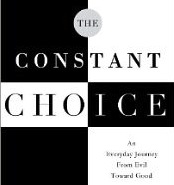 As a child growing up in Rumania, I’d been a traditional believer. But as I grew older, I wanted an intellectual model, a way of understanding God that didn’t conflict with science. I wanted an understanding of life that would give my own personal struggles a sense of meaning. My early model was simple and perhaps naïve. Our planet was populated by two kinds of people. The good and the bad, in endless struggle. But in the end, I believed, the good people would win. They would win because God was on the side of good, so good would always triumph over evil. Remarkably enough, this child-like model worked for me amazingly well throughout my youth and into early adulthood. Understand, I don’t mean to dismiss it with that adjective “child-like.” It was a powerful, benevolent—and, I think, partly accurate—vision of the world. The good does have an edge over evil. And we should all be trying out for that team.
As a child growing up in Rumania, I’d been a traditional believer. But as I grew older, I wanted an intellectual model, a way of understanding God that didn’t conflict with science. I wanted an understanding of life that would give my own personal struggles a sense of meaning. My early model was simple and perhaps naïve. Our planet was populated by two kinds of people. The good and the bad, in endless struggle. But in the end, I believed, the good people would win. They would win because God was on the side of good, so good would always triumph over evil. Remarkably enough, this child-like model worked for me amazingly well throughout my youth and into early adulthood. Understand, I don’t mean to dismiss it with that adjective “child-like.” It was a powerful, benevolent—and, I think, partly accurate—vision of the world. The good does have an edge over evil. And we should all be trying out for that team.
In fact, this early, simplistic model of the world likely saved my life. It gave me the strength and endurance to survive the horrors of Communist Rumania when I was separated from my parents for eight years and forced into physical labor in what were, at one point, life-threatening conditions of near starvation. Yet, later in life, after I’d come to America and was rising in the world of business, this model seemed less and less accurate. I saw good people tormented or ruined by others whose motives were clearly evil. I saw how success can be achieved, and how goodness often becomes just as much a handicap as a source of strength. I found myself in a spiritual crisis far more perilous than the physical extremes of my imprisoned life as a child. I felt my belief in a personal, interventionist deity begin to crumble. And with it, the entire structure of my worldview, a picture of the world that gave me a reason to get up every day, work hard, devote myself to my family, and harbor hopes for a better future. I felt I no longer had permission to believe in God, or in any transcendent force for good and love that could sustain an individual through suffering and trials. My faith began to crumble because its foundations had eroded. My emotional life began to come apart, and my body began to break down.
All of these struggles, from the past, came back to me now, as I waited for my surgery. I’d come through them and emerged with a new worldview, a new kind of faith, and an evolved belief in God. Yet now I found, once again, the prospect—albeit a statistically slim one—of not surviving my surgery, that my questioning returned. Death had put his head through the doorway, looked me in the eye and said, Come see me later. So, like the good diligent worker I’ve always been, I’ve begun to scramble, retracing my spiritual steps in my mind—testing my beliefs and plumbing the nature of my faith to see if it still held up. —The Constant Choice, Introduction